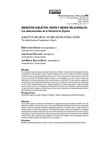Mostrar o rexistro simple do ítem
Bienestar subjetivo, renta y bienes relacionales: los determinantes de la felicidad en España
| dc.contributor.author | Iglesias, Emma M. | |
| dc.contributor.author | Pena-López, Atilano | |
| dc.contributor.author | Sánchez Santos, José Manuel | |
| dc.date.accessioned | 2017-11-24T10:45:46Z | |
| dc.date.available | 2017-11-24T10:45:46Z | |
| dc.date.issued | 2013 | |
| dc.identifier.citation | Iglesias Vázquez, E., Pena López, J. and Sánchez Santos, J. (2013). Bienestar subjetivo, renta y bienes relacionales. Los determinantes de la felicidad en España. Revista Internacional de Sociología, 71(3), pp.567-592. | es_ES |
| dc.identifier.issn | 0034-9712 | |
| dc.identifier.uri | http://hdl.handle.net/2183/19818 | |
| dc.description.abstract | [Resumen:] En el presente trabajo se analizan los determinantes de la felicidad, entendida esta como satisfacción subjetiva revelada. El principal objetivo tiene un doble componente: por un lado, se trata de contrastar la paradoja de Easterlin para la sociedad española (ausencia de un vínculo directo entre el incremento de la renta per capita y la evolución del bienestar subjetivo revelado a nivel agregado) y, por otro, evaluar el papel que desempeñan los bienes relacionales como determinantes de la felicidad. El marco analítico adoptado se encuadra dentro de la denominada happiness economics y la evidencia empírica se deriva de la estimación de una función microeconométrica de la felicidad aplicando un modelo Logit tanto en cortes temporales como en datos de panel. Los resultados obtenidos permiten concluir que en España el ingreso desempeña un papel secundario y subjetivo, mientras que se revelan como importantes las variables asociadas directa o indirectamente a los bienes relacionales. | es_ES |
| dc.description.abstract | [Abstract:] In the present paper we analyze the determinants of happiness proxying by subjective welfare. The main objective is twofold: on the one hand, to put to the test the Easterlin’s paradox (the lack of a direct relationship between income and subjective wellbeing at aggregate level) and, on the other hand, to weight influence of relational goods in determining happiness. The analytical framework adopts the perspective of happiness economics and the empirical evidence is derived from the estimation of a microeconometric function of happiness applying a Logit model both when using cross sectional and panel data. The results show that in Spanish society income plays a secondary and subjective role, while other variables that are associated directly or indirectly to relational goods are revealed to be very important. | es_ES |
| dc.language.iso | spa | es_ES |
| dc.publisher | CSIC | es_ES |
| dc.relation.uri | http://dx.doi.org/10.3989/ris.2012.04.11 | es_ES |
| dc.rights | Atribución 3.0 España | es_ES |
| dc.rights.uri | http://creativecommons.org/licenses/by/3.0/es/ | * |
| dc.subject | Satisfacción subjetiva revelada | es_ES |
| dc.subject | Paradoja de Easterlin | es_ES |
| dc.subject | Relación ingreso-felicidad | es_ES |
| dc.subject | Bienes relacionales | es_ES |
| dc.subject | Revealed Subjective Satisfaction | es_ES |
| dc.subject | Easterlin paradox | es_ES |
| dc.subject | Income-Happiness Relationship | es_ES |
| dc.subject | Relational goods | es_ES |
| dc.title | Bienestar subjetivo, renta y bienes relacionales: los determinantes de la felicidad en España | es_ES |
| dc.title.alternative | Subjective wellbeing, income and relational goods: the determinants of happiness in Spain | es_ES |
| dc.type | info:eu-repo/semantics/article | es_ES |
| dc.rights.access | info:eu-repo/semantics/openAccess | es_ES |
| UDC.journalTitle | Revista Internacional de Sociología (RIS) | es_ES |
| UDC.volume | 71 | es_ES |
| UDC.issue | 3 | es_ES |
| UDC.startPage | 567 | es_ES |
| UDC.endPage | 592 | es_ES |
Ficheiros no ítem
Este ítem aparece na(s) seguinte(s) colección(s)
-
GI-OSIM - Artigos [49]






